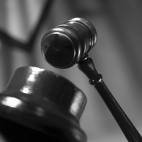The Sunday edition of the Tulsa World contains an article by Ben Braun detailing the varying style of dress donned by various courthouse players, from civil clients and criminal defendants to the "young" attorney caught without a tie on "causal" day at the office. The full article can be found here.
Reading the article brought to mind the seminal First Amendment, freedom of expression case, Cohen v. California, 430 U.S. 15 (1971) (A decision also famous for Justice Harlan's quote, "One man's vulgarity is another's lyric"). For background:
Reading the article brought to mind the seminal First Amendment, freedom of expression case, Cohen v. California, 430 U.S. 15 (1971) (A decision also famous for Justice Harlan's quote, "One man's vulgarity is another's lyric"). For background:
"On April 26, 1968, [Cohen] was observed in the Los Angeles County Courthouse in the corridor outside of division 20 of the municipal court wearing a jacket bearing the words ‘F**k the Draft’ which were plainly visible. There were women and children present in the corridor. [Cohen] was arrested. [Cohen] testified that he wore the jacket knowing that the words were on the jacket as a means of informing the public of the depth of his feelings against the Vietnam War and the draft." (Omission added).
Although not addressed by the Tulsa World article, the battle between dress and protest continues to rankle both government and citizen.
Take, for example, the case of Nicole and Jeffery Rank, who, in July of 2004 purchased tickets to attend a speech by President Bush. The tickets "provided that patrons would be seated on a first come, first served basis, without regard to either political affiliation or affinity with the President or his policies."
On July 4, 2004, the Ranks entered the area designated for the speech. While waiting for the President to arrive, the Ranks removed their outer shirts to display t-shirts that bore the international “no” symbol (a circle with a diagonal line across it) superimposed over the word “Bush.” Both shirts also displayed on the left sleeve a small photograph of President Bush with the international “no” symbol superimposed over it, and on the right sleeve a “Kerry” button. The message on the back of Nicole Rank's t-shirt was “Love America, Hate Bush.” On the back of Jeffrey Rank's shirt was the message “Regime Change Starts at Home.”
A short time later, the Ranks were approached by White House Event Staff Members who informed the Ranks that they could not remain on the grounds while wearing t-shirts critical of the President. When the Ranks refused to remove the shirts, they were arrested for trespassing by law enforcement officers who had previously been told that “White House Staff had the authority to revoke any person's ticket....”
On August 16, 2007, the government paid the Ranks $80,000 to dismiss their claim in what the ACLU described as, "a real victory not only for our clients but for the First Amendment."
Given the settlement, it is unknown how courts would decide the issue presented by the Ranks. On the one hand, the Ranks argue the First Amendment protects their expression from governmental intrusion. On the other hand, well-settled First Amendment jurisprudence clearly stands for the proposition that expressive freedoms are not "absolute," i.e., appropriate time, place and manner restrictions may apply depending upon the type of forum in which the expression occurred, in addition to other, content-based restrictions, e.g., the First Amendment does not protect fighting words or words intended to incite others.
Because content-based restrictions are the most loathsome restriction on free expression, and because the Ranks' t-shirts articulated a purely political message, unburdened by patently offensive language, the government would likely argue the President's speech was not an open forum. In other words, by requiring attendees to purchase a ticket, the nature of the forum at issue was materially altered by the terms and conditions of the ticket itself. As such, the government could impose content-neutral time, place and manner restrictions.
In the Ranks' case, it appears they were singled out because of the message appearing on their shirts, and not for any other reason. As such, it is difficult to fathom a content-neutral "time, place, manner," restriction that would govern the Ranks' personal dress to the exclusion of their corresponding freedom of expression.
(A more detailed analysis of First Amendment time, place and manner jurisprudence in the Northern District of Oklahoma, in the context of city council meetings, can be found here).
